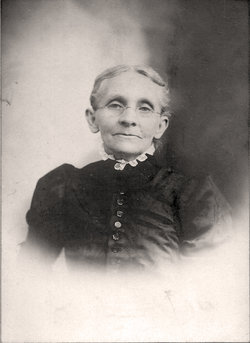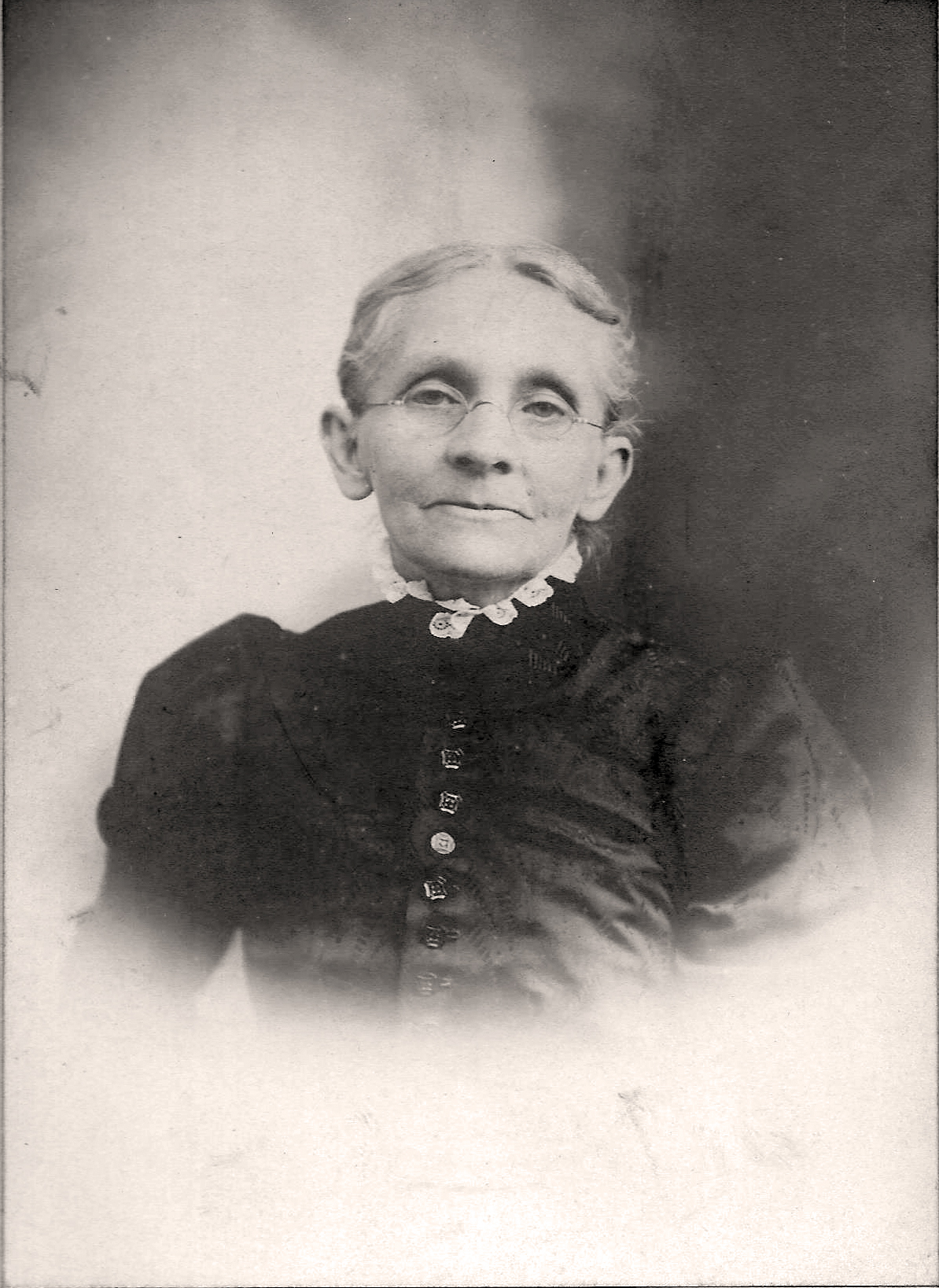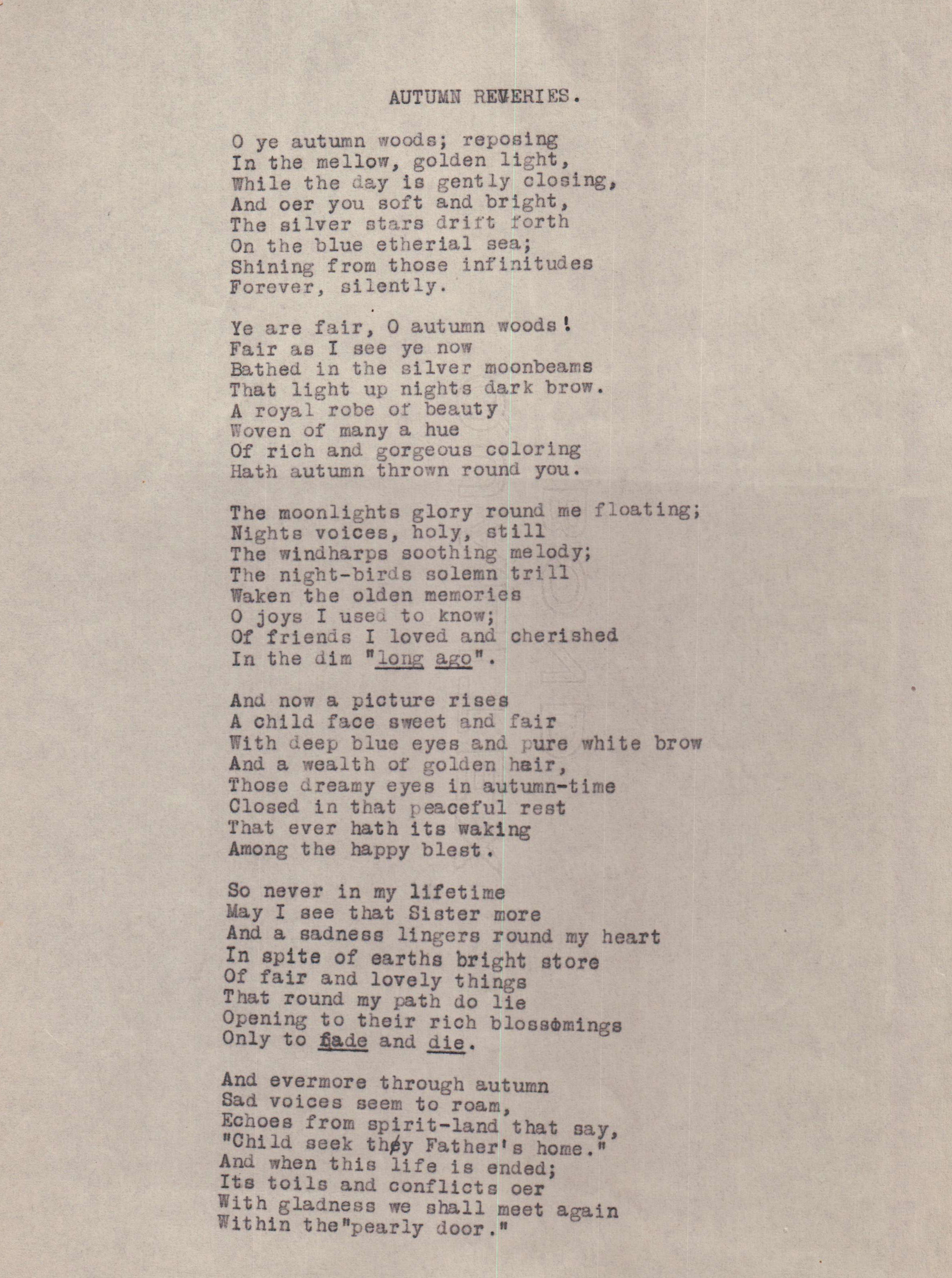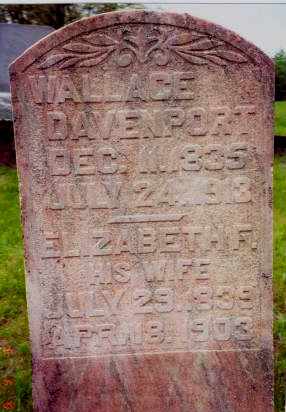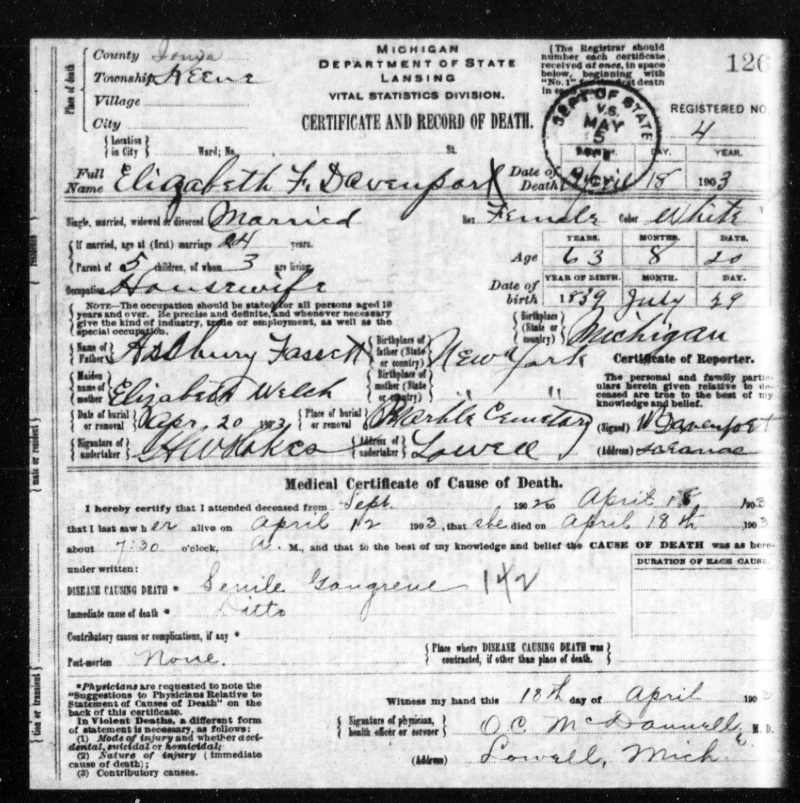Libbie's mother, Esther Elizabeth "Betsey" Welch Fassett, died when Libbie and her twin sister Frances were only six months old. Therefore Libbie and presumably Frances were "left largely to the loving care and guidance of a wise grandmother," according to Libbie's obituary, authored by daughter Luella. (Asbury later married Fanny Wilcox and had a son, Samuel. When he again became a widower, Asbury married Sarah M. Fonda, and they had a son, William David.)
In time, Libbie's father told her she could have forty acres of land or go to Albion College (then known as Wesleyan Seminary and Female College at Albion), a Methodist institution. She chose to go to college. In 1860 she was graduated with the degree of Mistress of Arts and Sciences and was named her 13-member class's valedictorian. Her valedictory address was titled "Faith and Action," and included the following:
But the beauty and mystery of being is the soul, on whose harpstrings the grandeur and glory of the universe play, with the power to make holy thoughts and exalted emotions. We are God's creatures and He has given us life for the noblest purpose [and] capacities that should be sanctified and devoted alone to the attainment of the good and true. Upon our brow rests the grandeur of intellect, the power of mind. We are here to accomplish a high destiny, to perform a grand mission. Life is no dream but a stern reality fraught with solemn truths... There is One Who looks not alone on the outward countenance and habiliments, Whose keen eye searches into the inmost depths of the heart and discerns motives and purposes, to Whom the spiritual life is all in all. And with faith in Him and confidence in yourself, labor earnestly with brain and heart and hand; and the choice gifts of poesy, of eloquence, of reason, of all that is most pure and excellent, may be yours.
While at Albion, Libbie went home for a visit with one Jennie Davenport--who happened to have a brother, Wallace. Libbie thus met Wallace, and they were later wed on June 2, 1864, in Eaton County, Mich. (Libbie's first choice had been Wallace's brother Nathaniel, but he died in the Civil War in 1863.) Their children would include Mary Luella (b.1865), Charles Nathaniel (b. 1867), an infant son (born and died the same day in 1869), Emerson (b. 1870) and Lura Elizabeth (b.1881).
Libbie's married life was not noted for its material wealth as Wallace became involved in lawsuits, though they did have 80 acres of land given to them by Wallace's father, and Wallace supplemented his farming with peddling milk safes (cupboards), fanning mills, etc.
Libbie once received a gift of venison from a Native American man. Wallace had given him a sack of buckwheat flour and said, "I give this to your squaw." Some time later the man threw a venison hindquarters on the floor and told Wallace, "I give this to your squaw."
Libbie died at her home in Keene Township at age 64 of senile gangrene, a form of tissue death caused by deterioration of the blood supply to the extremities in the elderly. She had experienced intense suffering for the final six months of her life, but Luella, her daughter who was at her deathbed, telegrammed this to her husband Edwin: "Mother went home this morning. Funeral Monday afternoon. Died easy."
A suggested obituary, written by her husband Wallace, ended thus: "...she was released and went home to Heaven to ever be with her Lord and Master, Whom she has faithfully served for more than forty years." Luella's final version read: "...she was released...and 'went home' as she had longed to do. Her last words were an assurance of the love of which her whole life was an example of the purest, holiest type."
Libbie's mother, Esther Elizabeth "Betsey" Welch Fassett, died when Libbie and her twin sister Frances were only six months old. Therefore Libbie and presumably Frances were "left largely to the loving care and guidance of a wise grandmother," according to Libbie's obituary, authored by daughter Luella. (Asbury later married Fanny Wilcox and had a son, Samuel. When he again became a widower, Asbury married Sarah M. Fonda, and they had a son, William David.)
In time, Libbie's father told her she could have forty acres of land or go to Albion College (then known as Wesleyan Seminary and Female College at Albion), a Methodist institution. She chose to go to college. In 1860 she was graduated with the degree of Mistress of Arts and Sciences and was named her 13-member class's valedictorian. Her valedictory address was titled "Faith and Action," and included the following:
But the beauty and mystery of being is the soul, on whose harpstrings the grandeur and glory of the universe play, with the power to make holy thoughts and exalted emotions. We are God's creatures and He has given us life for the noblest purpose [and] capacities that should be sanctified and devoted alone to the attainment of the good and true. Upon our brow rests the grandeur of intellect, the power of mind. We are here to accomplish a high destiny, to perform a grand mission. Life is no dream but a stern reality fraught with solemn truths... There is One Who looks not alone on the outward countenance and habiliments, Whose keen eye searches into the inmost depths of the heart and discerns motives and purposes, to Whom the spiritual life is all in all. And with faith in Him and confidence in yourself, labor earnestly with brain and heart and hand; and the choice gifts of poesy, of eloquence, of reason, of all that is most pure and excellent, may be yours.
While at Albion, Libbie went home for a visit with one Jennie Davenport--who happened to have a brother, Wallace. Libbie thus met Wallace, and they were later wed on June 2, 1864, in Eaton County, Mich. (Libbie's first choice had been Wallace's brother Nathaniel, but he died in the Civil War in 1863.) Their children would include Mary Luella (b.1865), Charles Nathaniel (b. 1867), an infant son (born and died the same day in 1869), Emerson (b. 1870) and Lura Elizabeth (b.1881).
Libbie's married life was not noted for its material wealth as Wallace became involved in lawsuits, though they did have 80 acres of land given to them by Wallace's father, and Wallace supplemented his farming with peddling milk safes (cupboards), fanning mills, etc.
Libbie once received a gift of venison from a Native American man. Wallace had given him a sack of buckwheat flour and said, "I give this to your squaw." Some time later the man threw a venison hindquarters on the floor and told Wallace, "I give this to your squaw."
Libbie died at her home in Keene Township at age 64 of senile gangrene, a form of tissue death caused by deterioration of the blood supply to the extremities in the elderly. She had experienced intense suffering for the final six months of her life, but Luella, her daughter who was at her deathbed, telegrammed this to her husband Edwin: "Mother went home this morning. Funeral Monday afternoon. Died easy."
A suggested obituary, written by her husband Wallace, ended thus: "...she was released and went home to Heaven to ever be with her Lord and Master, Whom she has faithfully served for more than forty years." Luella's final version read: "...she was released...and 'went home' as she had longed to do. Her last words were an assurance of the love of which her whole life was an example of the purest, holiest type."
Family Members
Sponsored by Ancestry
Advertisement
Explore more
Sponsored by Ancestry
Advertisement
